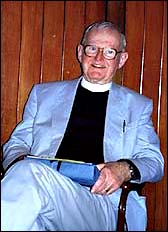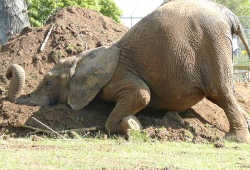Dorothy – 6/8/99
“A life of unbelievable privilege” –
an interview with the Very Rev. Dr Alan Brash. Part 3 – fresh challenges, but no longer in aid work.
If you haven’t already done so, you may wish to read Part One of this series.
1974 -99 Appointed Deputy General Secretary of the WCC Administrative role Alan’s new role was to oversee the general administration of the WCC headquarters in Geneva on behalf of the General Secretary. This meant overseeing the work of people from some forty nationalities, with a wide
range of different cultures, which could cause problems. Trying to make
staff regulations for a team like that was a task requiring diplomacy and
sensitivity. Their totally different reactions to time management and to
budgeting were just two clear examples of sensitive areas.
Administering the WCC Assembly in Nairobi Alan was also given the task of adminstering the WCC Assembly in Nairobi in
1975. This was an enormous job as four thousand people would be assembling
in one place. An inherent difficulty in organising everything from accommodation and food to services and agendas was the wide range of cultures involved.
Centrality of worship One of the exciting things about being on the staff of the World Council is
that every Monday morning for forty minutes before work begins there is a
worship service in the WCC Chapel. It may be taken by a priest of the Eastern Orthodox Church, or by a Quaker or anybody theologically in between. Each person takes that service according to his/her own tradition.
It may be led in any of the four languages – German, French, Russian or
English, and mostly more than one.
International contacts include links with churches in Eastern Europe Alan’s role also included keeping in day to day contact with the Asian
churches and East European churches under Communism. During the four years he was in this position he visited every one of those countries many
times. The only exception was Poland where there was no member church of
the WCC. He learnt a great deal about the sufferings, the courage and the
strengths of the East European churches.
New Zealanders visit East European churches After his retirement in 1978 Alan organised a party of twenty five New Zealanders to spend a month visiting churches in four East European countries – East Germany, the Soviet Union, Romania and Hungary. In western countries many people thought of the Christian churches under Communism as small and struggling.
One New Zealand minister was able to share experiences with an English speaking Orthodox priest in Moscow. He asked the Russian priest how many
baptisms he would take on average. The reply was forty or fifty. The New
Zealander replied that he was in a country parish and would have only a
dozen or fifteen in a year. The Russian priest replied that he didn’t mean
in a year, but every week!
These contacts opened the New Zealanders’ eyes to the reality of life for
the people in those churches and on their return they were able to share
their experiences and initiate continued contact with parishes in those
countries.
Alan always wears his Eastern Orthodox cross when preaching, because although there are wide theological differences between the Orthodox church
and the Western churches he has learnt so much from its people. He was
presented with crosses by the Patriarchs of Russia and Romania.
After “retirement” in 1978 On his return to New Zealand Alan was elected as Moderator of the Presbyterian Church and asked to spend his year in office developing New
Zealanders’ awareness of the value of the growing ecumenism. He and his
wife drove 35,000 km around New Zealand that year and Alan spoke to numerous groups around the country.
Back in his home in Auckland Alan worked half time at the Auckland branch
office of the National Council of Churches. Mitzi Nairn also worked there
on combating racism in New Zealand. He continued to preach regularly and
was actively involved in the Mairangi Bay parish.
Move to Christchurch After Eljean died in 1991 Alan moved to Christchurch and lives next door to
his daughter Lynette.
He has taken up teaching seminars on the Bible at the WEA (Workers Educational Association).
“Facing Our Differences”
|
|
| Alan Brash at the celebration of the sixtieth anniversary of his ordination. Photo source Alan Brash |
He has been deeply involved in the new understanding of homosexuality and
the WCC has published a book, “Facing Our Differences”, which Alan has written on the subject. He is greatly concerned that governments appear
more ready to adjust to the new understanding than the churches.
1998 brought the sixtieth anniversary of Alan’s ordination – a day honoured
by family and friends from many of the fields in which Alan has served the
church.
Those who know Alan and have worked with him say, “Truly his has been a
life of outstanding dedication to peace and ecumenism and service to others”. Alan sums his life up by saying: “Truly it has been a life of almost unbelievable privilege.”




